Results 1 to 6 of 6
-
01-19-2019, 08:57 PM #1Senior Member

- Join Date
- Nov 2016
- Location
- Germany
- Posts
- 111
Thanked: 30 Mottled black-brown polisher what is it?
Mottled black-brown polisher what is it?
Hey folks,
I have here a very interesting hone.
got it from UK, first it has looked black, very old and was loaded with oil.
Stone has rounded corners and rounded edges.
Once cleaned from oil I've noticed that the hone is full of sparkling dots shining in the sun light.
Stone appeared bein coarse so i could see the grit by naked eyes.
This pic was taken through 20x lens with my mobile, sadly the sparkles do not appear that intensive on the picture.
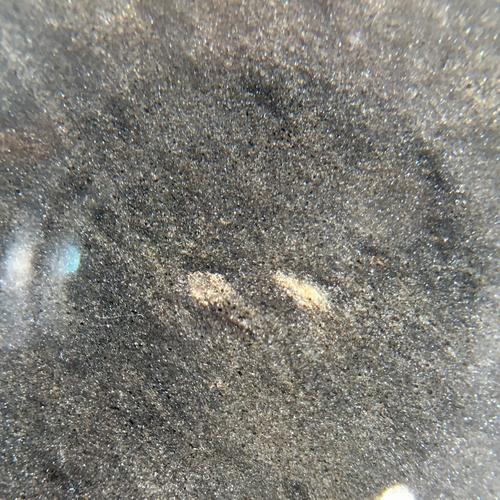
As per lapping the stone did feel quite hard and dense, it did a good job to considerably wear down my diamond plate.
While lapping the surface has showed some brown color to it and lot of veins/pattern and black dots.
Stone has released grey-brownisch slurry.
After diamond plate I went to whet/dry sandpaper 1000 and 2500. The hone has eated sandpapers during the sessions, i definetly cannot use them any more. Have lapped the working surface and one side of the stone.
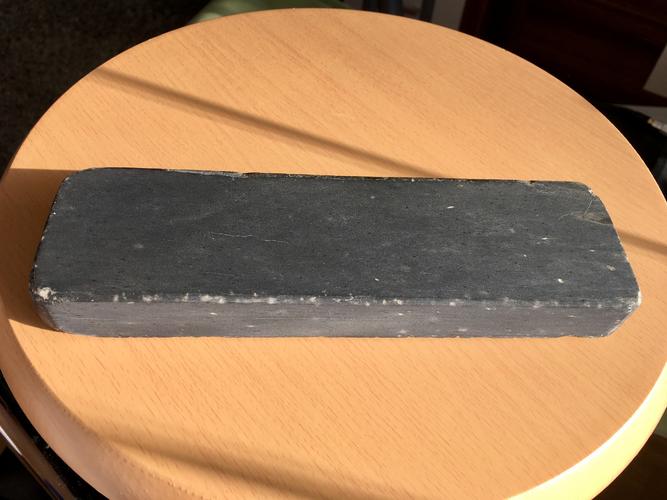
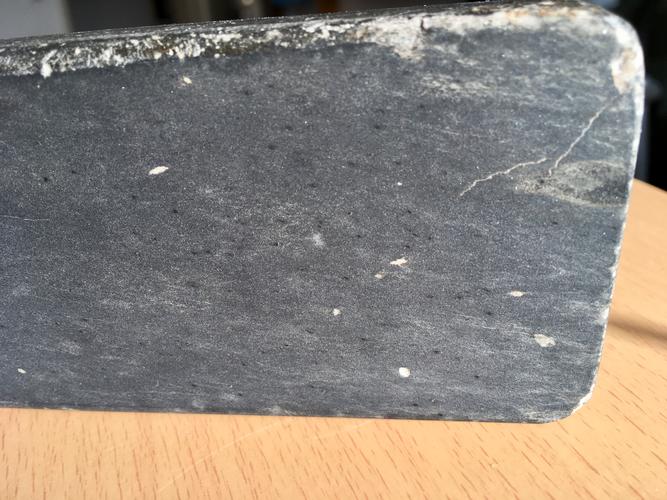
Here is the back side:
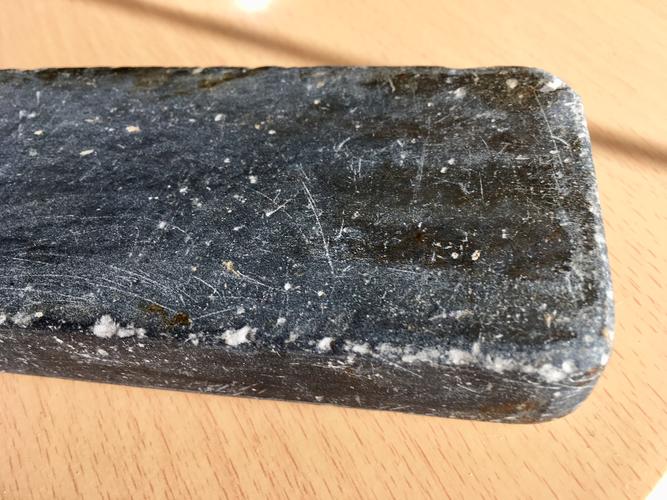
When I now hold it into the sun then apart from those sparkles I see lots of larger spots like small platos reflecting the light.
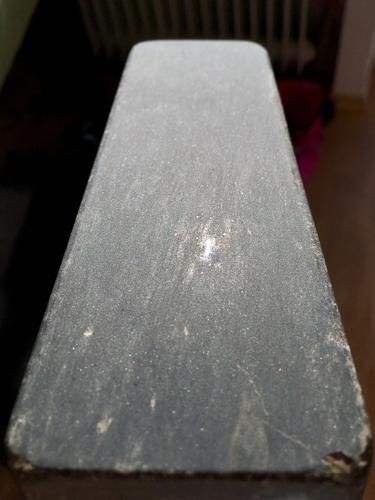
When i now put a water to the surface all the veins and dots and patterns pops in the sun light.
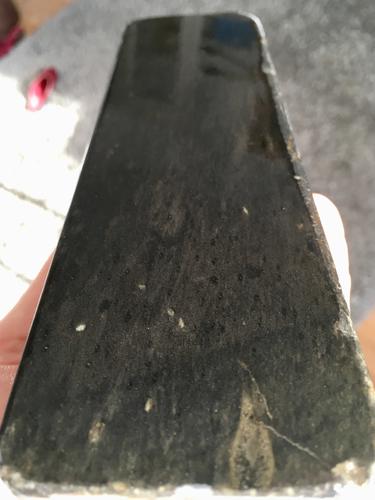
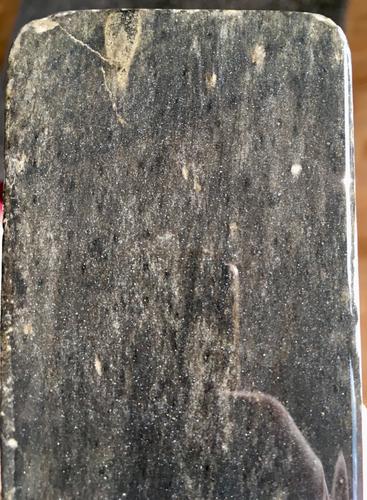
See the reflection of my mobile phone and my finger?
Under the artificial light still the pattern appears quite intensive when whet:
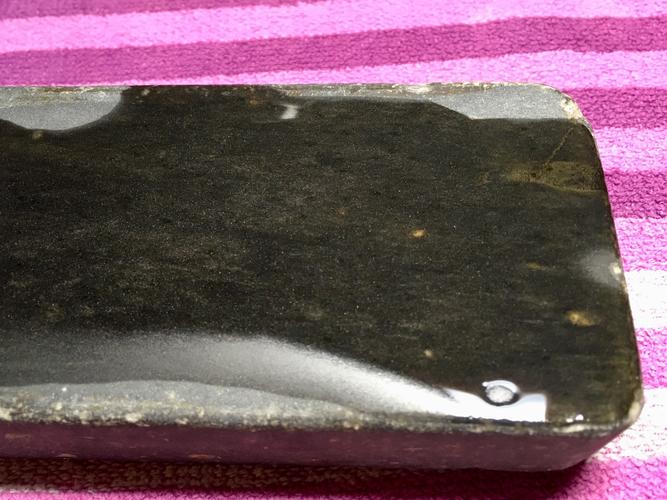
Btw. the surface feels extremly smooth to the fingers. It's like you look to a coarse stone but when you touch it feels like a glas.
OK, next i've created some slurry by DMT card (seems like the stone has not taken the oil into it as it accepts water like waterstones I have) and worked my testing razor (ERN 5/8) a little bit (half - strokes) with some pressure on it.
Under microscope I've seen the edge got toothy and some microchips were introduced. OK, berhabs they came because of the pressure... or bigger grit particles have caused them...
The slurry created by DMT looks almost white on the stone but dark-grey on the razor (strange!)
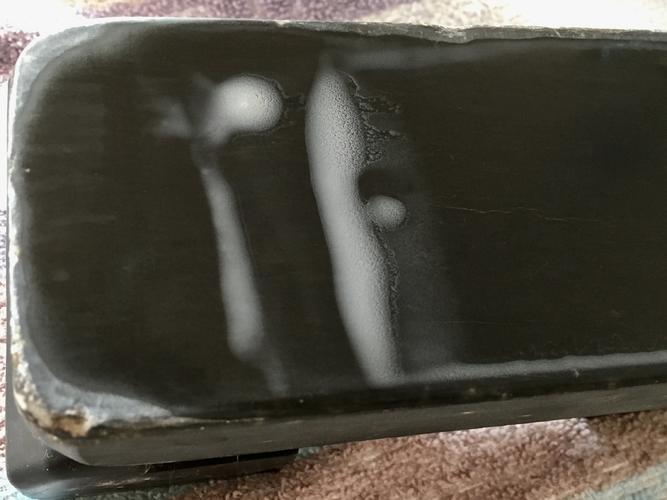
OK, now I've turned the razor and have done around 50 light spine leading strokes with very little pressure, just to see how the bevel will look like afterwards. Actuylls the honing has feeled smooth but the sound was a bit grainy...
Before the bevel has looked like this (160x):
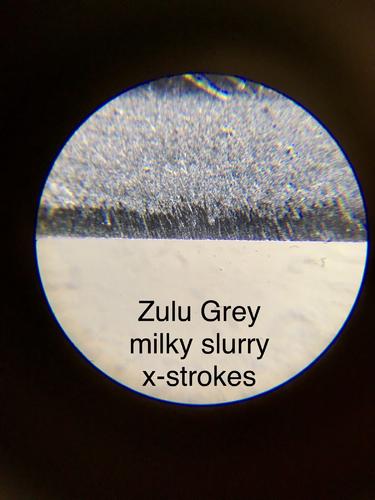
The lighter hazy part was created on a prefinisher (don't remember what hone) by applying little pressure and running spine leading strokes.
The dark part near to the apex was created by edge leading ultra-light strokes on the Zulu Grey with misty slurry.
After the new hone the bevel has turned black!!!
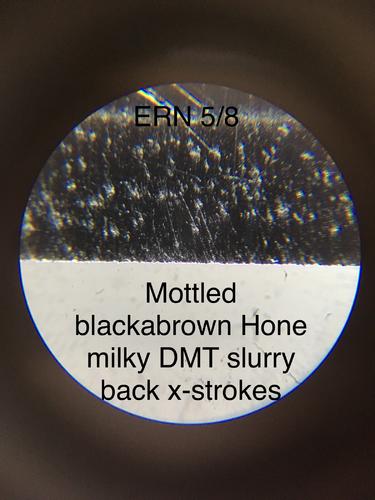
I do use a side light for my microscope which makes all scratches visible, this picture indicates very polished bevel.
Btw. you see the toothy edge was created by the first edge-leading run with pressure...
Wow OK, nex I've continued the spine leading honing and have slowly diluted the slurry to water and trying to apply as less pressure as possible. the grain sound was gone while processing and the feel got even much smoother. the feeling was like the razor does not even touch the stone but gliding above its surface...
Next look under the microscope (perhabs after 150 strokes or so):
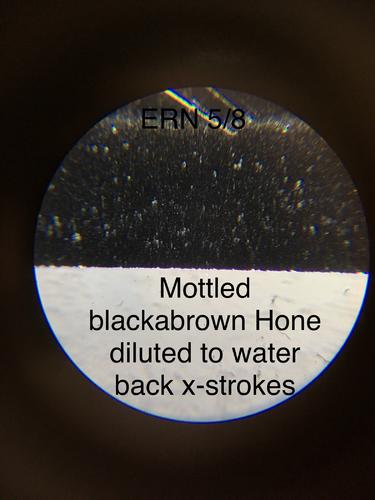
Wow, that's crazy!
I haven't seen a natural stone producing that level of polish before!
OK guys, what a heck is this stone?!
P.S. dimentions of the stone: 20cm x 6cm x 2.2cm, weight: 717gramms (makes ~2.83 spec. gravity)Last edited by Philipp78; 01-19-2019 at 09:32 PM.
-
01-20-2019, 03:05 AM #2Senior Member

- Join Date
- Sep 2013
- Location
- NW Indiana
- Posts
- 1,060
Thanked: 246
Good question. I've never seen a stone like that before. What is the magnification level of your microscope photos? Compared to the Zulu photo, the apex looks to show that the mystery stone is significantly coarser when used with slurry. Looking at the photos and hearing your description, I think I would be inclined to take a razor up to an 8k synth level then try your new stone with water or oil - staying away from the slurry.
-
01-20-2019, 07:30 AM #3Senior Member

- Join Date
- Nov 2016
- Location
- Germany
- Posts
- 111
Thanked: 30
The magnification of my microscope is 160x (10x of the objectiv times 16x of the eyepiece).
Thanks for the hints, will give it a try with oil or plain water.
-
01-20-2019, 02:21 PM #4Senior Member




- Join Date
- Feb 2013
- Location
- Haida Gwaii, British Columbia, Canada
- Posts
- 14,443
Thanked: 4828
There are a few places that you can look at examples of different hones and compare.
Razor loves stone is one of the pages. There is also this page * Olivia's Natursteine *It's not what you know, it's who you take fishing!
-
01-20-2019, 07:48 PM #5Senior Member

- Join Date
- Nov 2016
- Location
- Germany
- Posts
- 111
Thanked: 30
Thanks for the hints,
I‘ve checked those resources already.
... in parallel continue searching...
-
01-21-2019, 09:30 AM #6Senior Member

- Join Date
- Nov 2016
- Location
- Germany
- Posts
- 111
Thanked: 30
OK gens,
have done some further testing, still on water and slurry.
Starting situation was my ERN testing razor, comming from my translucent arkansas on oil.
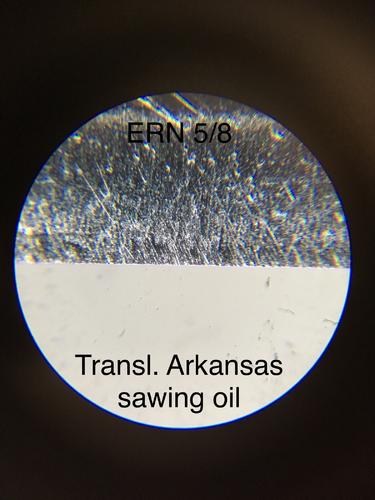
The bevel and the edge show at 160x magnification lots of scratches, not sure if it's my translucent arkie or its my lack of experience with honing on oil stones (this was my first attempt). After cleaning and linen stropping the edge has passed HHT4.
Back to the black-brown hone.
With slurry edge leading strokes will definately kill the edge. I've run 10 super light edge leading strokes on misty DMT slurry and the edge became scratchy and has dropped to HHT0.
Unfortunately I've forgotten to take a picture of the edge
OK, back to the spine leading strokes.
Have created rich creamy slurry by DMT card and have run a session of spine leading light strokes.
For each stroke I've placed 3 of my left hand fingers to the bevel, just touching to ensure that its making good contact with stone.
While honing for about forst 50-60 strokes I've heared that grainy sound.
After slowly the sound was going away and the feel becomes progressively gliding-smooth, same as described in my first post.
I assume the slurry does break down.
After about 150 strokes have put the razorudner the microscope:
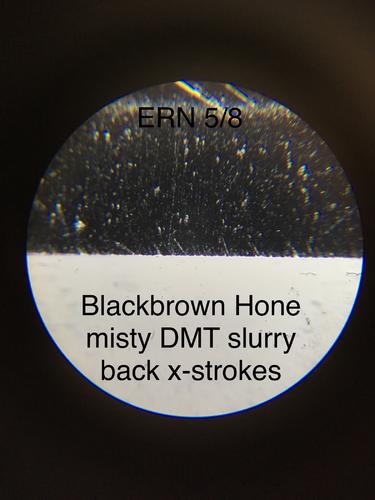
Most of the arkie scratches are gone, ther are still some visible along the very apex of the edge.
BTW: I've learned in a meanwhile that spine leading strokes do more work on the rear part of the bevel while edge leading strokes do more focus on the apex of the edge.
So will just continue honing pack strokes and slowly go down to the apex removing all the arkie stcratches.
I've rubbed more with my DMT card (always only little pressure, to not break chunks of the stone by those diamonds on the DMT card) on the hone and created rich pasry slurry.
Have started honing, still spine leading.
After couple of strokes I've recalled a video I'Ve seen on youtube showing the honemaster breadknifing the edge already finished on 30k. He has performed very light stroke with the edge touching the hone and has told that this will remove the micro teech on the apex. After he has performed couples of finishing strokes on the same 30k hone telling that that will bring the edge back without introducing new teeth.
So spontaneously I've grabbed my tiny jade-slurry stone (Its very lightweight and has very smooth surface) and breadknifed the razors edge barely touching the surface of the stone.
Then went back to working the pasty slurry down on the black-brown hone.
After about 100 strokes I've started to dilute the slurry by diping the blade into the waterglas every 20 strokes.
Dilution has taken another 100 strokes or so.
Then cleaned the stone, refreshed the water in the glas and have added dish soap to the water.
After abut 50 spine leading stroked on the soapy water I've cleaned the blade, stropped it on linen and put under the microscope:
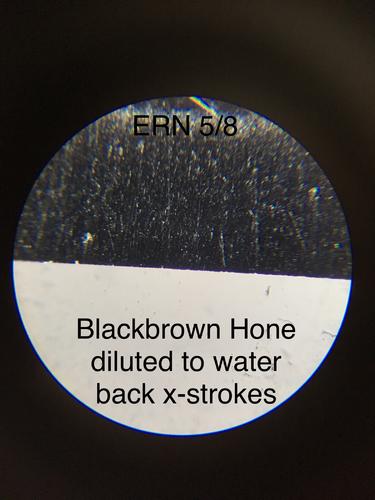
OK, the arkie's scratches are done and the edge seems to have been brought back from dulling it on jade slurry stone, I almost can see no light reflected by the apex of the edge (my light source is located on the pictures left-bottom corner ad normaly creates some reflection on the apex).
The apex line looks also very refined (white spots on the left are some kind of organic reminings, motes or similar).
Not sure if the edge now becomes to fragile for shaving, but this level of refinement I could not achieve before.
Here to compare the edge of new Wilkinson DE blade:
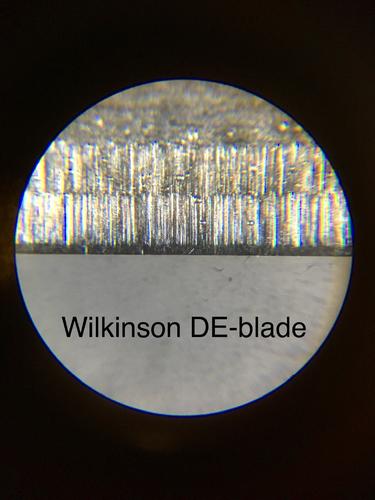
Will try the same procedure on one of my shaving-razors and see how it feels on my face
Regards
P.S. steel trying to figure out the ID of this rock...


 1Likes
1Likes
 LinkBack URL
LinkBack URL About LinkBacks
About LinkBacks






 Reply With Quote
Reply With Quote